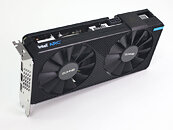Thursday, August 4th 2022

Intel Arc Board Partners are Reportedly Stopping Production, Encountering Quality Issues
According to sources close to Igor Wallossek from Igor's lab, Intel's upcoming Arc Alchemist discrete graphics card lineup is in trouble. As the anonymous sources state, certain add-in board (AIB) partners are having difficulty adopting the third GPU manufacturer into their offerings. As we learn, AIBs are sitting on a pile of NVIDIA and AMD GPUs. This pile is decreasing in price daily and losing value, so it needs to be moved quickly. Secondly, Intel is reportedly suggesting AIBs ship cards to OEMs and system integrators to start the market spread of the new Arc dGPUs. This business model is inherently lower margin compared to selling GPUs directly to consumers.
Last but not least, it is reported that at least one major AIB is stopping the production of custom Arc GPUs due to quality concerns. What this means is yet to be uncovered, and we have to wait and see which AIB (or AIBs) is stepping out of the game. All of this suggests that the new GPU lineup is on the verge of extinction, even before it has launched. However, we are sure that the market will adapt and make a case for the third GPU maker. Of course, these predictions should be taken with a grain of salt, and we await more information to confirm those issues.
Source:
Igor's Lab
Last but not least, it is reported that at least one major AIB is stopping the production of custom Arc GPUs due to quality concerns. What this means is yet to be uncovered, and we have to wait and see which AIB (or AIBs) is stepping out of the game. All of this suggests that the new GPU lineup is on the verge of extinction, even before it has launched. However, we are sure that the market will adapt and make a case for the third GPU maker. Of course, these predictions should be taken with a grain of salt, and we await more information to confirm those issues.

133 Comments on Intel Arc Board Partners are Reportedly Stopping Production, Encountering Quality Issues
I'd argue that Gelsinger is correcting Krzanich's mistake right now, and I will be expecting to see Mr Smoke & Mirrors fired, sorry, sent on a long holiday sometime soon.
I really hope Intel are not dragging their heels, hoping they can patch up drivers and people will overlook the shortcomings. Once AMD and Nvidia launches their next gen, these will only look weaker. So assuming there is no yield issue (defective dies etc.), and I expect them to have several hundred thousands of these ready, they should do the following:
Change course and rebrand these as "Arc Alchemist BETA", slash the price in two, and be upfront with this being an "unpolished" product. This would change the public opinion on these inferior products and turn it into something positive. The alternative would probably sell these for cheap to OEMs, which doesn't sound more profitable anyways.What? Vega 56/64 was a "disaster" for AMD. While Vega 56 slightly outperformed GTX 1070 and Vega 64 matched GTX 1080, they had many problems;
- Vega 56 cost $500 and Vega 64 $700 at launch (with that $100 game bundle gimmick, and liquid cooler for Vega 64), compared to $380 for GTX 1070 and $500 for GTX 1080 (and the Nvidia cards were even obtainable below MSRP). AMD eventually released them without the game bundle at $400/$500, but those were very hard to find. And even then, GTX 1070/1080 still had a better price/performance ratio.
- The power draw were horrible.
- These cards were really hard to find, AMD didn't make many of them as HBM was in short supply and very overpriced, resulting in AMD not earning much on these.
Edit: Typo
The problem for me is how wishy-washy they're being post-launch. They're absolutely destroying consumer goodwill with this sheepish response to the issues DG128 has. It makes them seem like they never really cared about it that much in the first place are being too willing to just abandon it. They either needed to be honest with their customers during the development process and make sure everybody knew this was a moonshot type launch and to brace for impact, or get the hype train rolling (like they did) and then when the launch didn't go the way they wanted it to, reassure everyone that they stand behind their promise and guarantee the product will improve and then actually DO it. Not, y'know, cut the entire damn AXG division.
I basically live next door to the site where Intel is set to build their new fabs in Ohio. People used to be absolutely hyped for it and the investment it would bring. Now the general sentiment is Intel is pulling an Amazon and is all talk about this grand new project but the delivery date might as well be 10 years out for all we know.
Plus, one can monetize even on this if one knows how to.
Well that's a first I've read about amd drivers from that age
Only lately have amd drivers been worth beans.
In 6-8 months when people are scratching their heads at why GPU prices are still so high despite the chip shortage largely being over I hope this thread gets referenced. Hope the're as comfortable bowing down to AMVidea as they are with begging for monopolistic corporate behavior. Yeesh. :kookoo:
Well in all honesty vega wasn't a very good naming for US it needed lots of modifications to be took seriously :laugh:
This is genuinely unsettling, especially coming from an industry giant like Intel. Points to some serious internal discordance. Like I said, under any other circumstances it would be ridiculous to think they would just completely get rid of AXG after investing so much money in the team, but something weird is going on with Intel right now. It's incredibly disheartening :(
But I'm not convinced Intel will give up discrete graphics at this point, and I don't think people should spread that rumor either. Massive negative press can certainly affect decisions in a company, so let's not give the Intel board that idea. ;)I know it's sad, but Optane has effectively been dead for a long time. Development of new generations stopped a couple of years ago, and production of chips by Micron stopped a while ago. Since then Intel have been using remaining stockpiles.
Why shouldn't I be happy that consumers won't be scammed by that bad product?
Why shouldn't I be happy that Intel's greed and incompetence has finally come back to bite them in the ass?
People like you keep harping on about a third competitor but Arc doesn't compete, it just barely exists. That's simply not acceptable in a market that requires innovation.
also hilarious that Radeon got better and competitive after Raja did go to Intel ... must be a coincidence right? :rolleyes:
i have a "you had one job... " moment ... pffff
it's not a grain of salt we need ... it's a boatload.
@TheoneandonlyMrK that makes two ... i also never had any driver issues with any AMD cards in years (while i had quite often to roll back drivers with Nvidia ... oh well, need exceptions to confirm rules? )
1st gen RDNA didn't beat Nvidia, and had lots of driver and heat issues, but we needed AMD to come up with something to break the monopoly. And they did, and now, everyone is happy with RDNA 2.All the more reason not to get rid of Arc just yet. It's better to axe one multimillion dollar industry than two.
Besides, Optane was on the market for years, so Intel had time to see that it wasn't profitable. Arc hasn't even been out, yet.
Both companies seem to be on and off when it comes to drivers it you look at it objectively
In fact, AMD's user interface is lightyears ahead of Nvidia's, and you don't have to register with your email address for a bunch of stuff like you do with GeForce Experience.
What people were expecting, was that Intel should be capable of creating a card which would maybe match the midrange cards from nVidia, at the top end.
What people were expecting, was lower prices than nVidia & AMD.
What people were expecting, was better availability of all graphics cards due to having another alternative on the market.
What people were expecting, was more competition for customers money, therefore reigniting the drive for new graphical features to differentiate between offerings from the 3 vendors.
What people were expecting, was having a 3rd player in the market would drive down prices overall.
What people were expecting, was that Intel should have had the experience and expertise to pull off a product launch with only minor issues, certainly not hardware ones. We all expected the drivers to be the weak point, as Intel simply does not know how to make them.